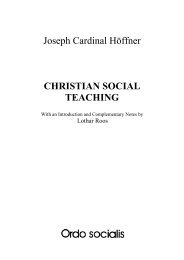Prof. Franz Josef Stegmann Bethlehem Social ... - Ordo Socialis
Prof. Franz Josef Stegmann Bethlehem Social ... - Ordo Socialis
Prof. Franz Josef Stegmann Bethlehem Social ... - Ordo Socialis
You also want an ePaper? Increase the reach of your titles
YUMPU automatically turns print PDFs into web optimized ePapers that Google loves.
<strong>Stegmann</strong><br />
• The larger and higher association, the community, must not "withdraw" and arrogate to<br />
itself "functions which can be performed (efficiently) and provided for by (individuals or)<br />
smaller and lower bodies"; it has only "subsidiarity" to intervene in order to enhance the<br />
abilities of the individual, but "never to destroy or absorb them”.<br />
• The community, however, must intervene and be "a help", if the individual is overtaxed;<br />
but the community must also take back again that "help for self-help", whenever it has<br />
been successful - a rule which one might call "subsidiary reduction". 29<br />
• The community has to create the conditions in order to enable individuals to practise their<br />
abilities and to carry out their tasks as well as possible.<br />
The principle of subsidiarity has often been misunderstood. The English expression<br />
“subsidiary" connotes "to be subordinated to someone" or "to be a second class matter, a<br />
second class subject". The noun "subsidiarity" is not even to be found in the Duden Oxford<br />
Dictionary (1990). With regard to the principle, these connotations are definitely wrong. The<br />
expression subsidium afferre, as the Latin text reads, demands "to be helpful", to "prove a<br />
help to members of the social body", and not "to subordinate someone to somebody"; and the<br />
expression numquam ea destruere et absorbere, as the Latin text continues, forbids larger<br />
associations "to destroy or absorb" their members. Human beings are not second class beings.<br />
Because of that, John XXIII rightly stated in the 1961 Pastoral Letter Mater et Magistra: "The<br />
cardinal point" of Christian <strong>Social</strong> Teaching and the basis of the subsidiarity principle is that<br />
individual human beings "are necessarily foundation, cause, and end of all social<br />
institutions". 30 Subsidiarity proclaims the help of the community for each of its members, but<br />
not their oppression. The principle refers to the human person as an individual, determines the<br />
areas of responsibility between the individuals and lower associations (such as families,<br />
municipalities and provinces) on the one hand, and the larger, higher community on the other.<br />
Its main function is to enable and safeguard freedom and liberty. Whoever puts special<br />
emphasis on the right of involvement and co-determination in state and society, is supported<br />
by the principle of subsidiarity. A central authority should perform only tasks that cannot be<br />
performed effectively at a local level.<br />
Therefore, decentralisation, the transfer of decisions to grass-roots level, federalism in a<br />
broader sense, and democratic forms of decision- making are not only in accordance with the<br />
principle, but are the realisation of subsidiarity.<br />
To refer to a few current problems: those who, according to the Amsterdam Treaty of<br />
Europe's unification process, support the decentralisation of decisions and strive for a Europe<br />
of Regions, try to put into effect the principle of subsidiarity. Those who in the process of<br />
building the new South Africa make every effort to situate as many areas of responsibility and<br />
decisions as possible at the local and provincial level, also try to realise the principle of<br />
subsidiarity.<br />
5. DEVELOPMENT AND TASK OF CHRISTIAN SOCIAL TEACHING<br />
5.1 Christian <strong>Social</strong> Teaching is as old as the Church itself<br />
The Church - the community of those who believe in the God of Jesus Christ - received the<br />
commandment from its founder to continue his work of salvation. This implies the Church's<br />
duty to look after social, political and economic issues that are significant for human<br />
salvation, and to proclaim its social teaching. Christian <strong>Social</strong> Teaching is therefore as old as<br />
29 Lothar Schneider, Subsidiäre Gesellschaft – Erfolgreiche Gesellschaft, Paderborn 3 1990, 31‐37, 35<br />
30 John XXIII, Mater et Magistra (1961), No. 219.<br />
17















